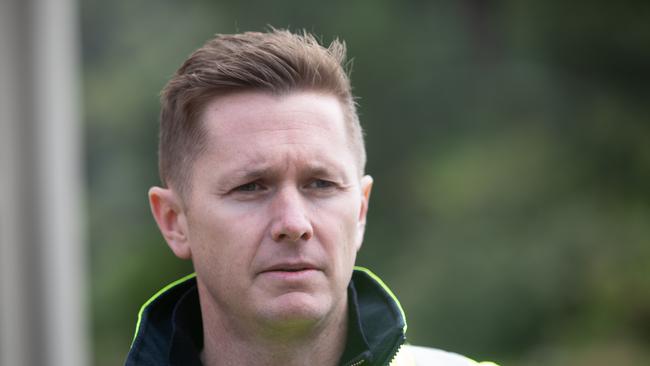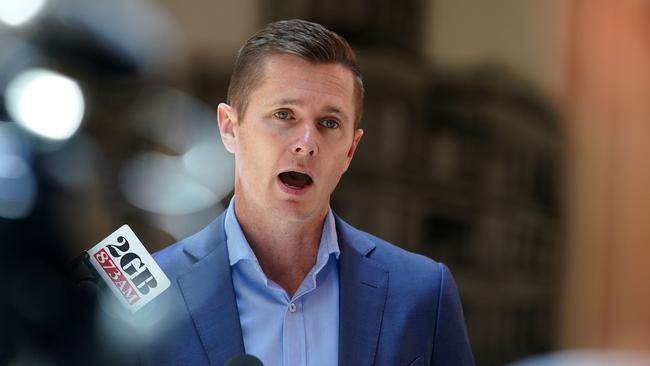Stop treating Australia’s critical minerals as ‘cash pinata’: AWU
Australian Workers Union boss Daniel Walton is set to blindside Anthony Albanese with an extraordinary attack on the government’s ‘lazy approach’ to critical mineral exports.

Australian Workers’ Union national secretary Daniel Walton says Anthony Albanese must impose a “significant, punitive tax” on raw critical minerals exports to protect the country’s security and economy from China’s dominance of critical minerals processing.
The AWU boss on Wednesday night will put the Albanese government on notice in a speech that questions Australia’s investment, strategic and export policies in the face of heightened global competition and rising tensions between China and the US.
Mr Walton, who will announce he is quitting as AWU national secretary after almost seven-years in the job, says Australia cannot afford to treat critical minerals as a “cash pinata” and continue shipping exports off to China without considering “our national interests”.
In an address to The Sydney Institute, the influential ALP Right-faction powerbroker will say that despite over a century of being “intertwined with the Australian Labor Party, we are certainly not one and the same”.
“When we believe a Labor government is at risk of taking the wrong path, we believe we have a responsibility to speak up,” Mr Walton will say.
Australia is the world’s largest producer of lithium, a key component of batteries that are driving the electric vehicle and clean energy boom, and among the top five countries in the world boasting vast reserves of cobalt, rare earth elements and nickel. In the past two years, lithium exports have jumped from $1.1bn to almost $14bn in 2022-23.
Mr Walton will warn of “catastrophic” outcomes if Australia adopts the same “lazy approach” it took on iron ore, coal and gas, and miscategorises critical minerals as “just another mining boom”.
“Catastrophic not just to our economy and to our national interests but catastrophic to global security. The situation in the 2020s is very different to the 1990s. Because while we may be the world’s biggest supplier of lithium, we only have, pretty much, one customer … 96 per cent of Australia’s lithium is going to China,” he will say.
“There it is being used to make components, which, in turn, is being used in batteries, solar panels, and military equipment. We assume that China will always be happy to sell us and our allies those components at a reasonable price.
“But we do that at the same time as we openly canvass the potential for tension.”
Considered a rising star in the union movement and elected ACTU vice-president in 2019, Mr Walton on Wednesday will announce his exit from the union in two-months. The 40-year-old, who followed in the footsteps of Bill Shorten and Paul Howes when he was elected AWU national secretary in 2016, will pursue a career in the private sector rather than politics.
While acknowledging the government’s critical minerals strategy and moves to support “like-minded” foreign investment in critical minerals, Mr Walton warns of Australia’s waning competitive edge if it fails to match incentives being rolled-out in the US, Europe and Indo-Pacific.
He will use next month’s ALP national policy forum to lobby support for the AWU’s push to impose a “tax on unprocessed exports of critical minerals and establish a production subsidy scheme to foster domestic refining, processing and component manufacturing from critical minerals”.
The AWU’s proposed ALP platform amendments will be debated ahead of the Brisbane national conference in August, where unions will argue for more ambitious policies to turbocharge domestic critical minerals refining, processing and manufacturing.
In his speech, Mr Walton will say while there is hope that relations between China and the US remain peaceful, “we also have to recognise the possibility that things could turn hot”.
“And if that were to happen the global supply chains on which Australia relies are suddenly all in jeopardy. How much do we trust China to keep supporting the Australian national interest? And if push comes to shove do we seriously expect they’ll put our national interest ahead of theirs?”
Mr Walton will say the government’s ambition to “manufacture batteries at scale in Australia” is impacted by having to “import a lot of componentry that is made in China”.
“That componentry is made from Australian critical minerals. Now if Australia starts making batteries that rival China’s – do we think China will be happy to keep selling us the components we need?”
“Do we really want to assume that we can keep digging up critical minerals, shipping them to China for processing, and China will just keep shipping them back to us to manufacture batteries? It’s not a bet I’d feel confident about.
“We know how China operates. They do, and will likely continue to, take a long-term view about dominating markets. That’s their prerogative. But we should not be blind to it.”
Mr Walton will say the government’s critical minerals investment is “nowhere near enough” and that pumping “modest incentives into the market” will end in failure.
“We won’t just need an incremental change here. Treasury doesn’t have access to enough carrots to encourage the change we need here. We need to get out the stick.”
Using International Energy Agency forecasts for critical minerals demand, Mr Walton predicts that direct employment in the sector could be more than doubled – in excess of 50,000 in 2030 and over 100,000 by 2040 – if Australia processed and refined its critical mineral ores. He identifies pathways into “stable, secure, well-paid quality jobs” for thousands of coal power generation workers over the decade.
“We need the revenue raised (from an export tax) to be pumped directly back into subsidies for the manufacturing and processing on critical minerals onshore. Basically we need to be using our sovereign ownership of these minerals to apply pressure from both ends.”
“The tax needs to be big enough that it gives multinationals pause. A flat volumetric tax of $1/tonne, for example, would probably be sufficient to encourage a shift from export to domestic processing at the margin.
“It would accept that we are a price-taker for our commodities, but it would encourage companies to stop and think about whether they could save by doing domestic processing, especially if that processing is subsidised by government.”

After travelling to the United States earlier this year, Mr Walton will say Joe Biden’s Inflation Reduction Act is a signal the US is “willing to use its unparalleled might to start driving manufacturing investment onshore”.
“When the 800 pound gorilla in the global room switches tack like this, everyone else is compelled to recognise things have changed. As the world’s largest economy it can use its raw economic heft and scale to force investment in manufacturing capacity through subsidies.”
“Australia is not in the same position to call the shots like this. But what we do have is a big chunk of the world’s critical minerals within our sovereign soil. That’s our leverage and we would be absolute fools not to use it.
“We know demand from the world for our critical minerals is astronomical. We have the power to create the rules under which they can have them.”
With global competitors delivering tax holidays and credits, government grants and infrastructure projects to support critical minerals associated industries, Mr Walton will say his tax proposal “is not even remotely extreme by global standards”.
Mr Walton said Indonesian President Joko Widodo recently “banned exports of Indonesian nickel”.
“Widodo recognised that nickel is critical to EV battery production. But he wanted the manufacturing jobs – not just the royalties.”
“And it’s paying dividends, with growing foreign investment in downstream processing and refining. Tax holidays and other incentives are also aimed at luring car makers and turning Indonesia into an EV manufacturing hub.”
Australia is in an extremely dangerous position - we no longer have the ability to produce enough of our own fuel to keep our country running. #AWU#AWUnion#ausunions#auspol#unionsaus#fuelsecurity#fuelrefineriespic.twitter.com/mlv7CbWhLU
— AWU - Australian Workers' Union (@AWUnion) May 2, 2023
Hyundai this month announced it was “stepping-up production of its best-selling all-electric vehicle in Indonesia from its assembly plant in West Java”, which will be exported into Australia and South-East Asia.
Mr Walton will warn that without Australia’s resources, the world “will not reach net zero”.
“Renewable energy is dependent on critical minerals. Wind turbines need copper, rare earth elements and nickel; solar panels use large amounts of silicon, silver and gallium; and battery storage technologies are reliant on lithium, nickel, cobalt and manganese.”
“The emerging hydrogen industry is also mineral intensive and will require large amounts of platinum, copper, nickel and rare earth elements.”






To join the conversation, please log in. Don't have an account? Register
Join the conversation, you are commenting as Logout